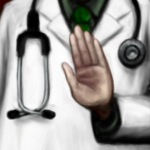Self-harm is not usually an attempt at taking our own life, but a way of expressing deep emotional feelings, such as low self-esteem. It is also a way to cope with traumatic events or situations, such as the death of a loved one, or an abusive relationship. Self-harm is not an illness, it is an expression of personal distress.
How much mental health presents in emergency departments? We don’t really know

Kirsten Lawson is frustrated by the uncertainty highlighted in a recent systematic review of the epidemiology of mental health attendances at emergency departments.
[read the full story...]









